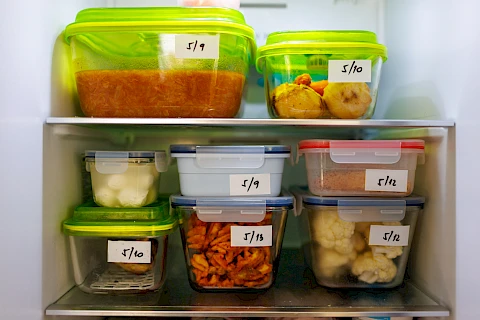
September is National Food Safety Month, which means it's the perfect time to review some essential tips for keeping food safe for ourselves and our loved ones. Today we'll offer some food safety tips focused on the needs of seniors. Senior Helpers in Waxhaw-Monroe explore how aging affects the elderly’s need for enhanced food safety, share best practices for storing and reheating leftovers, debunk common food safety myths, and offer additional tips to keep your kitchen safe.
Why Food Safety for Seniors Requires Extra Vigilance
As we age, our bodies undergo various changes that can impact how we respond to food. For example, seniors often have weaker immune systems, which makes them more vulnerable to foodborne illnesses. Our sense of smell and taste can also dull over time, making it harder to detect spoiled food.
Aging also impacts digestion. Seniors may have less stomach acid, which helps fight off harmful bacteria. All these factors mean that food safety practices must be tailored to protect seniors from potential risks better.
Proper Storage of Leftovers
Leftovers can be convenient, but they must be stored correctly to remain safe for consumption. Here are some best practices:
- Store leftovers in the refrigerator within two hours of cooking. They should be kept at 40°F or below and consumed within 3-4 days to prevent bacteria growth.
- Always label your leftovers with the date and contents. This helps you track how long they've been stored and ensures you don't eat anything past its safe period.
- Store leftovers in clear, airtight containers on the shelves, not the door, where temperatures can be less consistent. Keep raw foods separate from cooked foods to avoid cross-contamination.
Safe Reheating Practices
Reheating leftovers properly is vital for food safety. Ensure food reaches an internal temperature of at least 165°F to kill harmful bacteria. Use a food thermometer to check temperatures. When using a microwave, cover food with a microwave-safe lid or wrap to distribute heat evenly and prevent splatters. Stir food halfway through reheating to ensure an even temperature throughout.
It's important to avoid cross-contamination when reheating food. Always use clean plates and utensils for reheated food. Never reheat food more than once, as this increases the risk of bacterial growth.
Common Food Safety Misconceptions
There are several dangerous food safety myths. One common misconception is that if food looks and smells fine; it's safe to eat. The truth is that some harmful bacteria don't produce an odor or change the appearance of food. Always follow proper storage and reheating guidelines, even if food seems okay.
Another myth is that freezing kills all bacteria. While freezing can slow down bacterial growth, it doesn't kill all bacteria. Always cook or reheat food to the right temperature to ensure safety. Finally, never taste food to check its safety. Even a small taste can introduce harmful bacteria into your system.
More Food Safety Tips for Seniors
Maintaining good hygiene is critical for food safety. Always wash your hands with soap and water before handling food. Keep kitchen surfaces, utensils, and appliances clean to prevent contamination. When handling food, separate raw meat from other foods in your shopping cart and refrigerator, and during preparation. Use separate cutting boards for raw meat and other foods.
When choosing food options, choose pasteurized (rather than raw) milk and cheese, and avoid raw or undercooked eggs, meat, and fish.
Stay Safe in the Kitchen With Senior Helpers
Observing food safety is crucial, especially for older adults. For assistance with senior care in Waxhaw, Monroe, Concord, Kannapolis, and Salisbury, contact us at Senior Helpers Waxhaw-Monroe today. Our wide selection of services includes help with meal planning, preparation, and cleanup, allowing seniors to live safe and independent lives at home.